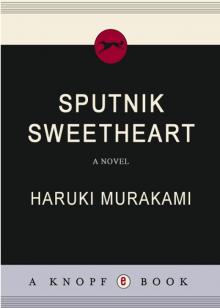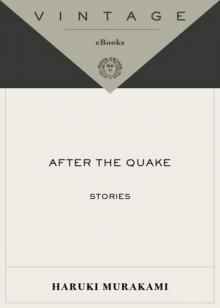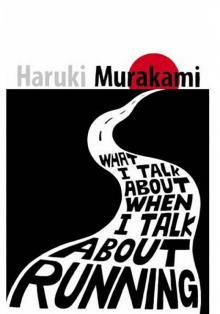- Home
- Haruki Murakami
The Elephant Vanishes: Stories Page 13
The Elephant Vanishes: Stories Read online
Page 13
“We?” I threw back the question.
“Me and him,” came her self-evident reply.
“Sure,” I had to say, “by all means.”
“Okay, we’ll be there in thirty minutes,” she said, then hung up.
I lay there on the sofa awhile longer before taking a shower and shaving. As I toweled myself dry, I wondered whether to tidy up around the house but canned the idea. There wasn’t time. And despite the piles of books and magazines and letters and records, the occasional pencil here or sweater there, the place didn’t seem particularly dirty. I sat back down on the sofa, looked at the camphor tree, and ate another apple.
They showed up a little past two. I heard a car stop in front of the house, and went to the front door to see her leaning out the window of the silver-gray coupe, waving. I directed them to the parking space around back.
“We’re here,” she beamed, all smiles. She wore a sheer blouse that showed her nipples, and an olive-green miniskirt. He sported a navy blazer, but there was something else slightly different about him; maybe it was the two-day growth of beard. Not at all slovenly looking, it even brought out his features a shade. As he stepped from the car, he removed his sunglasses and shoved them into his breast pocket.
“Terribly sorry to be dropping in on you like this on your day off,” he apologized.
“Not at all, don’t mind a bit. Every day might as well be a day off with me, and I was getting kind of bored here on my own,” I allowed.
“We brought some food,” she said, lifting a large white paper bag from the backseat of the car.
“Food?”
“Nothing extraordinary,” he spoke up. “It’s just that, a sudden visit on a Sunday, I thought, why not take along something to eat?”
“Very kind of you. Especially since I haven’t had anything but apples all morning.”
We went inside and set the groceries out on the table. It turned out to make quite a spread: roast beef sandwiches, salad, smoked salmon, blueberry ice cream—and good quantities at that. While she transferred the food to plates, I grabbed a bottle of white wine from the refrigerator. It was like an impromptu party.
“Well, let’s dig in. I’m starved,” pronounced her usual ravenous self.
Midway through the feast, having polished off the wine, we tapped into my stock of beer. I can usually hold my own, but this guy could drink; no matter how many beers he downed, his expression never altered in the slightest. Together with her contribution of a couple of cans, we had in the space of a little under an hour racked up a whole tableful of empties. Not bad. Meanwhile, she was pulling records from my shelf and loading the player. The first selection to come on was Miles Davis’s “Airegin.”
“A Garrard autochanger like that’s a rare find these days,” he observed. Which launched us into audiophilia, me going on about the various components of my stereo system, him inserting appropriate comments, polite as ever.
The conversation had reached a momentary lull when the guy said, “I’ve got some grass. Care to smoke?”
I hesitated, for no other reason than I’d only just quit smoking the month before and I wasn’t sure what effect it would have. But in the end, I decided to take a toke or two. Whereupon he fished a foil packet from the bottom of the paper bag and rolled a joint. He lit up and took a few puffs to get it started, then passed it to me. It was prime stuff. For the next few minutes we didn’t say a word as we each took hits in turn. Miles Davis had finished, and we were now into an album of Strauss waltzes. Curious combination, but what the hell.
After one joint, she was already beat, pleading grass on top of three beers and lack of sleep. I ferried her upstairs and helped her onto the bed. She asked to borrow a T-shirt. No sooner had I handed it to her than she’d stripped to her panties, pulled on the T-shirt, and stretched flat out. By the time I got around to asking if she was going to be warm enough, she had already snoozed off. I went downstairs, shaking my head.
Back in the living room, her guy was busy rolling another joint. Plays hard, this dude. Me, I would have just as soon snuggled into bed next to her and conked right out. Fat chance. We settled down to smoke the second joint, Strauss still waltzing away. Somehow, I was reminded of an elementary-school play. I had the part of the old glove maker. A fox cub comes with money to buy gloves, but the glove maker says it’s not enough for a pair.
“’Tain’t gonna buy no gloves,” I say. Guess I’m something of a villain.
“But Mother’s so very c-c-cold. She’ll get chapped p-p-paws. P-p-please,” says the fox cub.
“Uh-uh, nothing doing. Save your money and come back. Otherwise—”
“Sometimes I burn barns,” the guy was saying.
“Excuse me?” I asked. Had I misheard him?
“Sometimes I burn barns,” the guy repeated.
I looked at him. His fingertips traced the pattern on his lighter. Then he took a deep draw on the joint and held it in for a good ten seconds before slowly exhaling. The smoke came streaming out of his mouth and into the air like ectoplasm. He passed me the roach.
“Quality product, eh?” he said.
I nodded.
“I brought it from India. Top of the line, the best I could find. Smoke this and, it’s strange, I recall all kinds of things. Lights and smells and like that. The quality of memory …” He paused and snapped his fingers a few times, as if searching for the right words. “… completely changes. Don’t you think?”
That it did, I concurred. I really was back in the school play, reexperiencing the commotion on stage, the smell of the paint on the cardboard backdrop.
“I’d like to hear about this barn thing,” I said.
He looked at me. His face wore no more expression than ever.
“May I talk about it?” he asked.
“Why not?” I said.
“Pretty simple, really. I pour gasoline and throw a lighted match. Flick, and that’s it. Doesn’t take fifteen minutes for the whole thing to burn to the ground.”
“So tell me,” I began, then fell silent. I was having trouble finding the right words, too. “Why is it you burn barns?”
“Is it so strange?”
“Who knows? You burn barns. I don’t burn barns. There’s this glaring difference, and to me, rather than say which of us is strange, first of all I’d like to clear up just what that difference is. Anyway, it was you who brought up this barn thing to begin with.”
“Got me there,” he admitted. “You tell it like it is. Say, would you have any Ravi Shankar records?”
No, I didn’t, I told him.
The guy spaced out awhile. I could practically see his mind kneading like Silly Putty. Or maybe it was my mind that was squirming around.
“I burn maybe one barn every two months,” he came back. Then he snapped his fingers again. “Seems to me that’s just about the right pace. For me, that is.”
I nodded vaguely. Pace?
“Just out of interest, is it your own barns you burn?” I thought to ask.
The guy looked at me uncomprehendingly. “Why have I got to burn my own barns? What makes you think I’d have this surplus of barns, myself?”
“Which means,” I continued, “you burn other people’s barns, right?”
“Correct,” he said. “Obviously. Other people’s barns. Which makes it, as it were, a criminal act. Same as you and me smoking this grass here right now. A clear-cut criminal act.”
I shut up, elbows on the arms of my chair.
“In other words, I wantonly ignite barns that belong to other people. Naturally, I choose ones that won’t cause major fires. All I want to do is simply burn barns.”
I nodded and ground out what was left of the roach. “But, if you get caught, you’ll be in trouble. Whatever, it’s arson, and you might get prison.”
“Nobody’s going to get caught.” He laughed at the very idea. “Pour the gas, light the match, and run. Then I watch the whole thing from a distance through binoculars, nice and easy. Nob
ody catches me. Really, burn one shitty little barn and the cops hardly even budge.”
Come to think of it, they probably wouldn’t. On top of which, who’d suspect a well-dressed young man driving a foreign car?
“And does she know about this?” I asked, pointing upstairs.
“Not a thing. Fact is, I’ve never told anyone else about this but you. I’m not the sort to go spouting off to just anyone.”
“So why me?”
The guy extended his fingers of his left hand and stroked his cheek. The growth of beard made a dry, rasping sound. Like a bug walking over a thin, taut sheet of paper. “You’re someone who writes novels, so I thought, Wouldn’t he be interested in patterns of human behavior and all that? And the way I see it, with novelists, before even passing judgment on something, aren’t they the kind who are supposed to appreciate its form? And even if they can’t appreciate it, they should at least accept it at face value, no? That’s why I told you. I wanted to tell you, from my side.”
I nodded. Just how was I to accept this at face value? From my side, I honestly didn’t know.
“This might be a strange way to put it,” he took off again, spreading both hands, then bringing them slowly together before his eyes. “But there’s a lot of barns in this world, and I’ve got this feeling that they’re all just waiting to be burned. Barns built way off by the seaside, barns built in the middle of rice fields … well, anyway, all kinds of barns. But nothing that fifteen minutes wouldn’t burn down, nice and neat. It’s like that’s why they were put there from the very beginning. No grief to anyone. They just… vanish. One, two, poof!”
“But you’re judging that they’re not needed.”
“I’m not judging anything. They’re waiting to be burned. I’m simply obliging. You get it? I’m just taking on what’s there. Just like the rain. The rain falls. Streams swell. Things get swept along. Does the rain judge anything? Well, all right, does this make me immoral? In my own way, I’d like to believe I’ve got my own morals. And that’s an extremely important force in human existence. A person can’t exist without morals. I wouldn’t doubt if morals weren’t the very balance to my simultaneity.”
“Simultaneity?”
“Right, I’m here, and I’m there. I’m in Tokyo, and at the same time I’m in Tunis. I’m the one to blame, and I’m also the one to forgive. Just as a for instance. It’s that level of balance. Without such balance, I don’t think we could go on living. It’s like the linchpin to everything. Lose it and we’d literally go to pieces. But for the very reason that I’ve got it, simultaneity becomes possible for me.”
“So what you’re saying is, the act of burning barns is in keeping with these morals of yours?”
“Not exactly. It’s an act by which to maintain those morals. But maybe we better just forget the morality. It’s not essential. What I want to say is, the world is full of these barns. Me, I got my barns, and you got your barns. It’s the truth. I’ve been almost everywhere in the world. Experienced everything. Came close to dying more than once. Not that I’m proud of it or anything. But okay, let’s drop it. My fault for being the quiet type all the time. I talk too much when I do grass.”
We fell silent, burned out. I had no idea what to say or how. I was sitting tight in my mental passenger seat, just watching one weird scene after the next slip past the car window. My body was so loose I couldn’t get a good grasp on what the different parts were doing. Yet I was still in touch with the idea of my bodily existence. Simultaneity, if ever there was such a thing: Here I had me thinking, and here I had me observing myself think. Time ticked on in impossibly minute polyrhythms.
“Care for a beer?” I asked a little later.
“Thank you. I would.”
I went to the kitchen, brought out four cans and some Camembert, and we helped ourselves.
“When was the last time you burned a barn?” I had to ask.
“Let’s see, now.” He strained to remember, beer can in hand. “Summer, the end of August.”
“And the next time, when’ll that be?”
“Don’t know. It’s not like I work out a schedule or mark dates in my calendar. When I get the urge, I go burn one.”
“But, say. When you get this urge, some likely barn doesn’t just happen to be lying around, does it?”
“Of course not,” he said quietly. “That’s why I scout out ones ripe for burning in advance.”
“To lay in stock.”
“Exactly.”
“Can I ask you one more question?”
“Sure.”
“Have you already decided on the next barn to burn?”
This caused him to furrow up wrinkles between his eyes; then he inhaled audibly through his nose. “Well, yes. As a matter of fact, I have.”
I sipped the last of my beer and said nothing.
“A great barn. The first barn really worth burning in ages. Fact is, I went and checked it out only today.”
“Which means, it must be nearby.”
“Very near,” he confirmed.
So ended our barn talk.
At five o’clock, he roused his girlfriend, and then apologized to me again for the sudden visit. He was completely sober, despite the quantities of beer I’d seen him drink. Then he fetched the sports car from around back.
“I’ll keep an eye out for that barn,” I told him.
“You do that,” he answered. “Like I said, it’s right near here.”
“What’s this about a barn?” she broke in.
“Man talk,” he said.
“Oh, great,” she fawned.
And at that, the two of them were gone.
I returned to the living room and lay down on the sofa. The table was littered with all manner of debris. I picked up my duffle coat off the floor, pulled it over my head, and conked out.
Bluish gloom and a pungent marijuana odor covered everything. Oddly uneven, that darkness. Lying on the sofa, I tried to remember what came next in the elementary-school play, but it was long since irretrievable. Did the fox cub ever get the gloves?
I got up from the sofa, opened a window to air the place, went to the kitchen, and made myself some coffee.
THE FOLLOWING DAY, I went to a bookstore and bought a map of the area where I live. Scaled 20,000:I and detailed down to the smallest lanes. Then I walked around with the map, penciling in X’s wherever there was a barn or shed. For the next three days, I covered four kilometers in all four directions. Living toward the outskirts of town, there are still a good many farmers in the vicinity. So it came to a considerable number of barns—sixteen altogether.
I carefully checked the condition of each of these, and from the sixteen I eliminated all those where there were houses in the immediate proximity or greenhouses alongside. I also eliminated those in which there were farm implements or chemicals or signs that they were still in active use. I didn’t imagine he’d want to burn tools or fertilizer.
That left five barns. Five barns worth burning. Or, rather, five barns unobjectionable if burned. The kind of barn it’d take fifteen minutes to reduce to ashes, then no one would miss it. Yet I couldn’t decide which would be the one he’d be most likely to torch. The rest was a matter of taste. I was beside myself for wanting to know which of the five barns he’d chosen.
I unfolded my map and erased all but those five X’s. I got myself a right angle and a French curve and dividers, and tried to establish the shortest course leaving from my house, going around the five barns, and coming back home again. Which proved to be a laborious operation, what with the roads winding about hills and streams. The result: a course of 7.2 kilometers. I measured it several times, so I couldn’t have been too far off.
The following morning at six, I put on my training wear and jogging shoes and ran the course. I run six kilometers every morning anyway, so adding an extra kilometer wouldn’t kill me. There were two railroad crossings along the way, but they rarely held you up. And otherwise, the scenery wouldn’t be bad.
>
First thing out of the house, I did a quick circuit around the playing field of the local college, then turned down an unpaved road that ran along a stream for three kilometers. Passing the first barn midway, a path took me through woods. A slight uphill grade, then another barn. A little beyond that were racehorse stables. The Thoroughbreds would be alarmed to see flames—but that’d be it. No real damage.
The third and fourth barns resembled each other like ugly twins. Set not two hundred meters apart, both were weather-beaten and dirty. You might as well torch the both of them together.
The last barn stood beside a railroad crossing. Roughly the six-kilometer mark. Utterly abandoned, the barn had a tin Pepsi-Cola billboard nailed to the side facing the tracks. The structure—if you could call it that—was such a shambles, I could see it, as he would say, just waiting to be burned.
I paused before this last barn, took a few deep breaths, cut over the crossing, and headed home. Running time: thirty-one minutes thirty seconds. I showered, ate breakfast, stretched out on the sofa to listen to one record, then got down to work.
For one month, I ran the same course each morning. But—no barns burned.
Sometimes, I could swear he was trying to get me to burn a barn. That is, to plant in my head the image of burning barns, so that it would swell up like a bicycle tire pumped with air. I’ll grant you, there were times that, well, as long as I was waiting around for him to do the deed, I half considered striking the match myself. It would have been a lot faster. And anyhow, they were only run-down old barns….
Although on second thought, no, let’s not get carried away. You won’t see me torch any barn. No matter how inflated the image of burning barns grew in my head, I’m really not the type. Me, burn barns? Never. Then what about him? He’d probably just switched prospects. Or else he was too busy and simply hadn’t found the time to burn a barn. In any case, there was no word from her.
December came and went, and the morning air pierced the skin. The barns stood their ground, their roofs white with frost. Wintering birds sent the echo of flapping wings through the frozen woods. The world kept in motion unchanged.

 Sputnik Sweetheart
Sputnik Sweetheart Dance Dance Dance
Dance Dance Dance The Wind (1) and Up Bird Chronicle (2)
The Wind (1) and Up Bird Chronicle (2) Blind Willow, Sleeping Woman
Blind Willow, Sleeping Woman Absolutely on Music: Conversations With Seiji Ozawa
Absolutely on Music: Conversations With Seiji Ozawa Norwegian Wood
Norwegian Wood South of the Border, West of the Sun
South of the Border, West of the Sun Kafka on the Shore
Kafka on the Shore Men Without Women
Men Without Women After Dark
After Dark Hard-Boiled Wonderland and the End of the World
Hard-Boiled Wonderland and the End of the World 1q84
1q84 The Wind-Up Bird Chronicle
The Wind-Up Bird Chronicle Underground: The Tokyo Gas Attack and the Japanese Psyche
Underground: The Tokyo Gas Attack and the Japanese Psyche Vintage Murakami
Vintage Murakami The Elephant Vanishes: Stories
The Elephant Vanishes: Stories Colorless Tsukuru Tazaki and His Years of Pilgrimage
Colorless Tsukuru Tazaki and His Years of Pilgrimage First Person Singular
First Person Singular After the Quake
After the Quake A Wild Sheep Chase
A Wild Sheep Chase What I Talk About When I Talk About Running
What I Talk About When I Talk About Running Birthday Girl
Birthday Girl The Elephant Vanishes
The Elephant Vanishes Norwegian Wood (Vintage International)
Norwegian Wood (Vintage International) Wind/Pinball
Wind/Pinball Norwegian Wood Vol 1.
Norwegian Wood Vol 1. Underground
Underground Colorless Tsukuru Tazaki and His Years of Pilgrimage: A novel
Colorless Tsukuru Tazaki and His Years of Pilgrimage: A novel Killing Commendatore
Killing Commendatore Absolutely on Music
Absolutely on Music